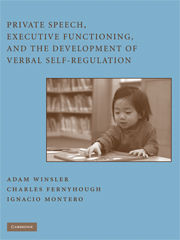Book contents
- Frontmatter
- Contents
- List of Contributors
- Foreword
- Introduction
- Part I Theoretical and Biological Foundations
- Part II Language, Communication, Social Cognition, and Awareness
- Part III Symbols and Tools throughout the Life Span
- Part IV Motivational and Educational Applications
- 15 Private Speech and Motivation: The Role of Language in a Sociocultural Account of Motivational Processes
- 16 Creativity and Private Speech in Young Children
- 17 Early Childhood Teachers' Awareness, Beliefs, and Practices toward Children's Private Speech
- Afterword
- Index
- References
Afterword
from Part IV - Motivational and Educational Applications
Published online by Cambridge University Press: 29 July 2009
- Frontmatter
- Contents
- List of Contributors
- Foreword
- Introduction
- Part I Theoretical and Biological Foundations
- Part II Language, Communication, Social Cognition, and Awareness
- Part III Symbols and Tools throughout the Life Span
- Part IV Motivational and Educational Applications
- 15 Private Speech and Motivation: The Role of Language in a Sociocultural Account of Motivational Processes
- 16 Creativity and Private Speech in Young Children
- 17 Early Childhood Teachers' Awareness, Beliefs, and Practices toward Children's Private Speech
- Afterword
- Index
- References
Summary
This edited volume constitutes what Mikhail Mikhailovich Bakhtin (1986) would have called another “utterance” in an ongoing dialogue about the role of speech in human life, specifically an utterance about private speech. What is particularly impressive about this particular utterance is the wide array of disciplinary voices involved in it. There have long been participants from psychology, especially developmental and educational psychology, in the dialogue, but the range of voices from this field is significantly widened in this book. In addition to scholars interested in issues such as self-regulation, we now see others concerned with bringing issues such as theory of mind into the debate. Furthermore, other disciplines such as cognitive science make their appearance in ways not previously seen.
The inclusion of all these new players in the dialogue on private speech is to be welcomed and reflects the dynamism and productivity of this ongoing project. Indeed, the publication of this volume suggests that even more new voices are likely to make contributions in the future. In the following pages, however, my focus will be less on what is to come and more on a few key ideas from the past.
Analysts often trace the discussion of private speech back to ideas first espoused by American psychologists in the 1960s or to writings of Jean Piaget and Lev Semënovich Vygotsky starting in the 1920s.
- Type
- Chapter
- Information
- Private Speech, Executive Functioning, and the Development of Verbal Self-Regulation , pp. 247 - 250Publisher: Cambridge University PressPrint publication year: 2009

